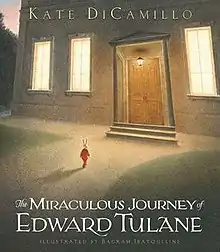Bagram Ibatoulline is a Russian-born artist who has illustrated numerous books for younger readers written by Philip Booth, Kate DiCamillo, Michelle Houts, Stephen Mitchell, Linda Sue Park, Lois Lowry and others. His illustrations have been noted in reviews in The New York Times, Kirkus Reviews, and other national publications. Maria Russo wrote in 2019 that "Ibatoulline’s realistic watercolors astound and enchant, as always."[1][2][3][4]
Early life
Ibatoulline was raised in Omsk, and at the age of 15 his family moved from Omsk to Kazan. After finishing his secondary education there, he spent four years as a student at the Kazan Art School. He served in the Russian army, and then entered the Surikov Art Institute in Moscow. He emigrated to the United States in 1991. His first book as an illustrator was Crossing (2001); the book is based on a poem by Philip Booth, and its narrative is created by its illustrations.[5][6][2]

The Miraculous Journey of Edward Tulane
Kate DiCamillo and Ibatoulline received the 2006 Boston Globe–Horn Book Award for The Miraculous Journey of Edward Tulane. Michael Hearn's review in The New York Times noted that "Bagram Ibatoulline's haunting color plates and sepia illustrations at the beginning of each chapter evoke the era of Andrew Wyeth, Howard Pyle and Maxfield Parrish."[7] In 2012 it was ranked number 59 among all-time children's novels in a survey published by School Library Journal .[8]
Great Joy by Kate DiCamillo
In 2007, Bagram Ibatoulline illustrated Kate DiCamillo's first picture book, Great Joy. Great Joy is a Christmas picture book.
References
- ↑ Russo, Maria (August 1, 2019). "Picture Books to Perk Up Any Kid's Summer". The New York Times.
Ibatoulline's ("The Hawk of the Castle") realistic watercolors astound and enchant, as always.
Review of Sea Glass Summer by Michelle Houts. - 1 2 "Crossing". Kirkus Reviews. October 1, 2001. Retrieved 2022-11-07.
Ibatoulline skillfully captures a sense of the rolling stock's hugeness, depicts rust and machinery with magnificent precision, gives his human cast a cheery, Norman Rockwell–style wholesomeness, and backs off in one spread to show all 100 cars (count them) spiraling into a tunnel.
- ↑ "Great Joy". Publishers Weekly.
Ibatoulline's (The Miraculous Journey of Edward Tulane) WWII-era scenes have a subdued yet comforting glow, illuminated by streetlamps and stage lights.
- ↑ Gurdon, Meghan Cox (April 14, 2017). "The Best New Children's Books". The Wall Street Journal.
Mr. Ibatoulline's fine, realistic pictures of castle, landscape and soaring predator have a wonderful feeling of sweep and drama.
- ↑ Sarinova, Lina (July 25, 2018). "'Being a book illustrator nowadays is, of course, old-fashioned, but very cool'". Realnoe Vremya. Retrieved 2022-11-07. Interview of Bagram Ibatoulline.
- ↑ Booth, Philip; Ibatoulline, Bagram (2001). Crossing. Candlewick. ISBN 0-7636-1420-3.
- ↑ Hearn, Michael Patrick (May 14, 2006). "Rabbit Redux". The New York Times.
- ↑ Bird, Elizabeth (July 7, 2012). "Top 100 Chapter Book Poll Results". School Library Journal. A Fuse #8 Production. Retrieved 2022-11-08.
Further reading
- Bird, Betsy (June 17, 2016). "Review of the Day: Coyote Moon by Maria Gianferrari". School Library Journal. Retrieved 2022-11-08.
I've been a big time fan of artist Bagram Ibatoulline for years. He's one of those artists that are so good he'll never ever win any American illustration awards. Such people exist all the time and this is particularly true of artists who truck with realism.
External links
- "Bagram Ibatoulline". Ibatoulline's website reproduces many of his illustrations.
- "Illustrator Bio: Bagram Ibatoulline". Candlewick Press. Retrieved 2022-11-07. Publisher's biography of Ibatoulline.